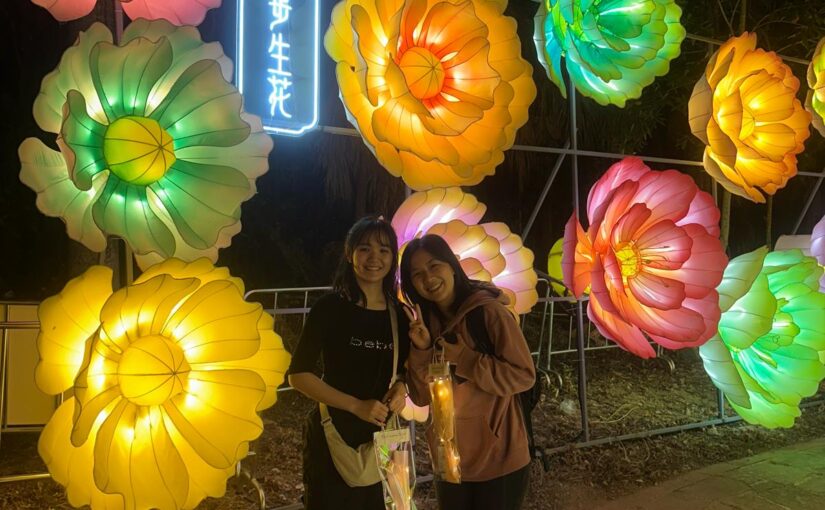Field of study in Wageningen: Msc Biology
Study period exchange: 31/02/2024 – 29/05/2024
Country (exchange): China
City (exchange): Hong Kong
University (exchange): Hong Kong University of Science and Technology
Faculty (exchange): School of Sciences
2. Motivation for exchange
Why did you choose to go on study exchange?
I wanted to experience different cultures, meet new people and go out of my comfort zones by living abroad for a short while.
What is the reason you chose for this country?
I really wanted to study abroad in Asia, because I really like the food and as my parents come from China, so I wanted to experience how it would be like to live and work close to my own roots. Also, Hong Kong is close to where my family lives, so I could visit them more often and also practice my mandarin. I’ve never visited Hong Kong before either, so I was really interested in its culture as well as exploring a new place.
What is the reason you chose for this university?
This university offers life sciences courses that would fit my current study programme.
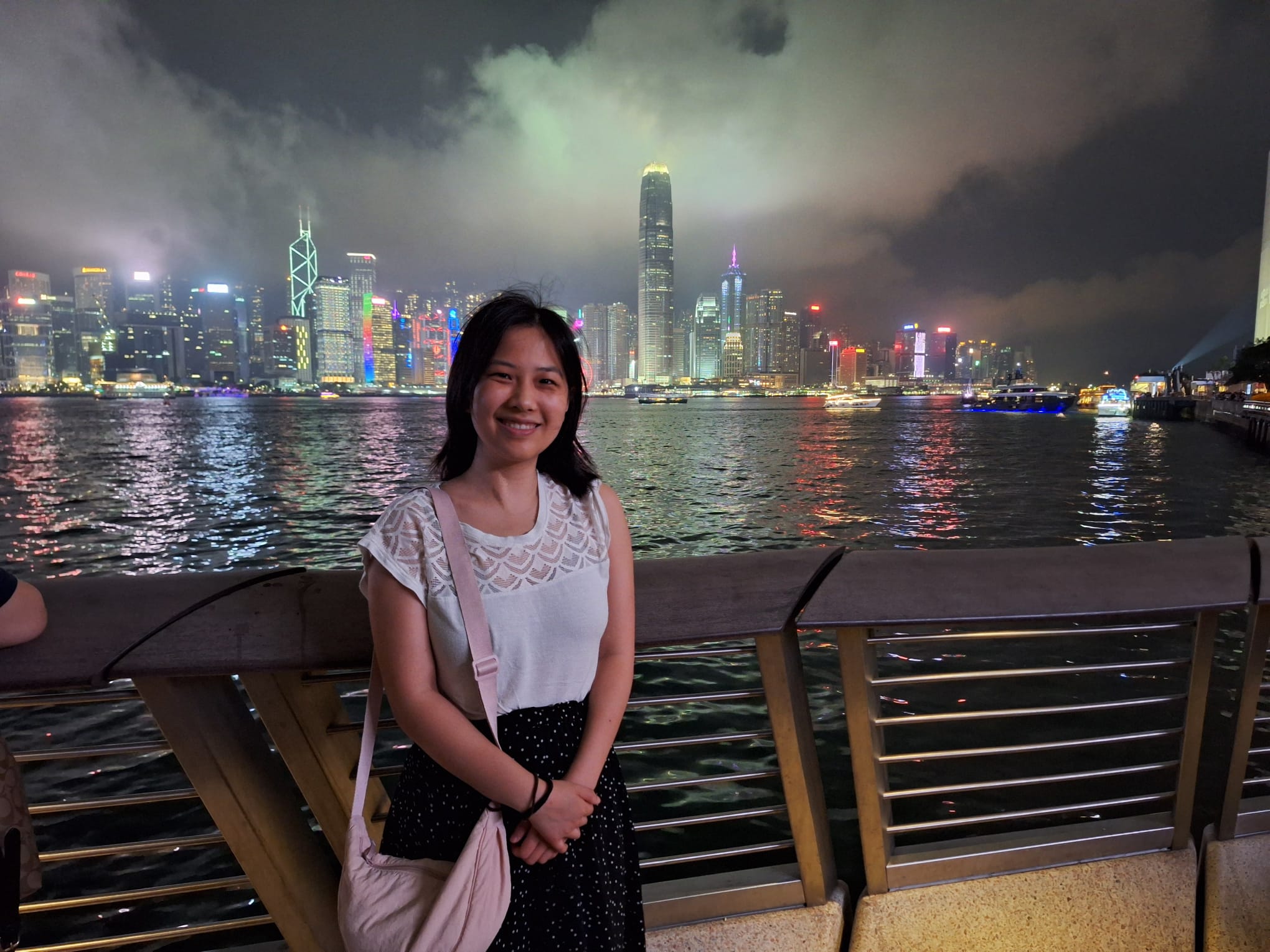
3. Accessibility to reach destination
I took a flight to Hong Kong from Amsterdam. If you’re planning to travel after your exchange, I would recommend buying single journey tickets. Travel from the airport is a bit more tricky, you can take a taxi to your dorm (around 400HKD). You can reach out to other exchange students though and see if you can share the taxi fees, which I did on my first day! Alternatively, you can go by MTR, but the MTR section between the airport and the other MTR lines charges an additional 100HKD. The cheapest way (which I used subsequently to travel to and from the airport) is to go by bus (~40HKD).
4. University and studying
Could you provide some general information about the followed courses?
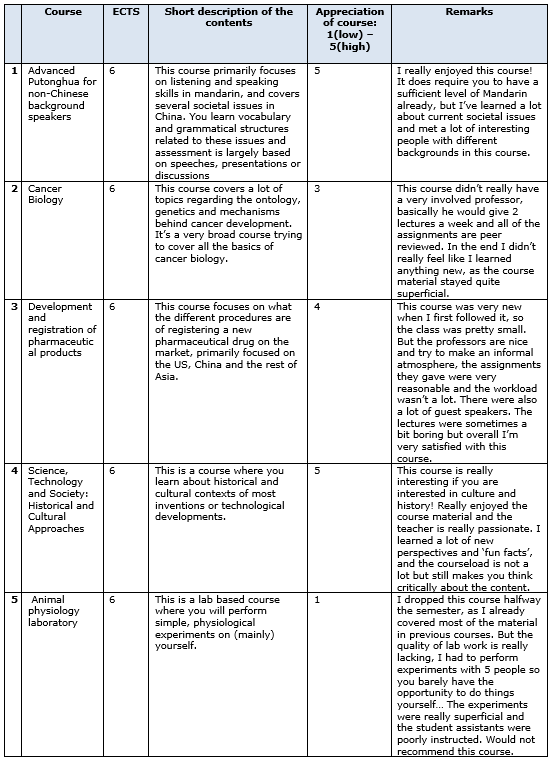
I had sufficient possibilities to select suitable courses that were taught in English: Yes, almost all courses are in English.
I had sufficient possibilities to select suitable courses in my field of interest: Yes, there are quite some courses available for life sciences.
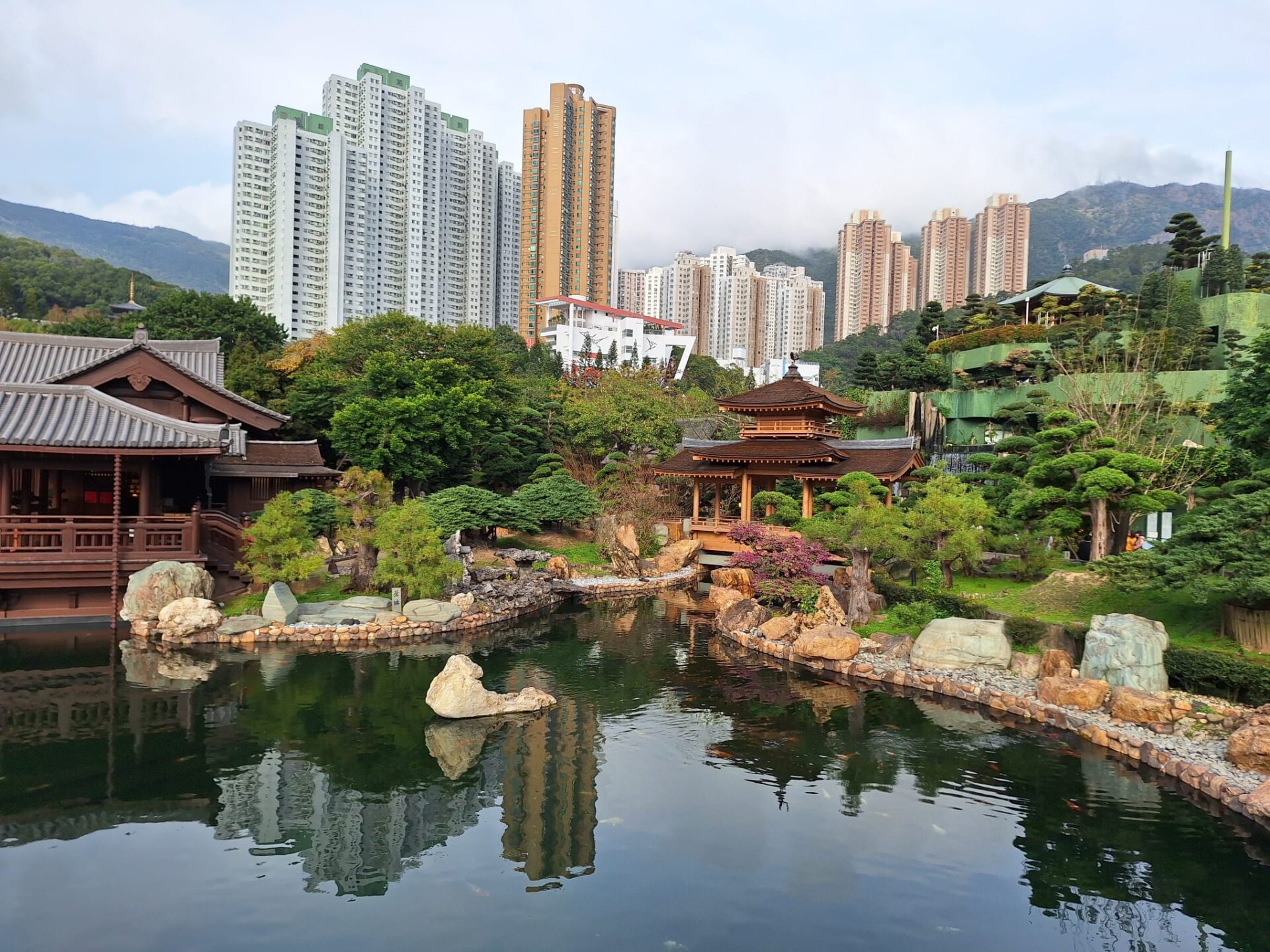
I am satisfied with the level of the courses that I followed: No, personally I felt that the life science courses were a bit lacking and stayed very superficial, especially for a master student. Also, the course structure/set up and the assessment was quite messy for some of the courses I followed.
I am satisfied, in the end, with the selection of courses I followed: No, I wished that I followed more challenging or useful courses. I think I would’ve learned more by choosing other courses that cover different fields.
What is it like to study there?
Most of the courses gave lectures twice a week, and gave multiple assignments over the term, which could be individual reports and/or group presentations. Personally, I found that the coursework load was pretty high if you wanted to score well, but the level of the courses stayed more superficial than the courses at the WUR which are generally more specialized. One thing that really frustrated me is that you never got any feedback for the assignments, and often times the examination descriptions are pretty vague. Generally, there is more need for self study and classes are not as interactive as at the WUR.
What is the culture of the university?
The culture is very different than from the WU. Teachers are basically not involved with student work, never give feedback on your assignments and have little no interaction with the students. Likewise, the students never ask questions, rarely show up to lectures but spend all their time in the library doing self study. The HKUST is very competitive, as students are graded on a curve and they feel more pressured to get higher marks. I noticed that especially during group work or peer reviews, that people handle projects a lot more differently than WU students.
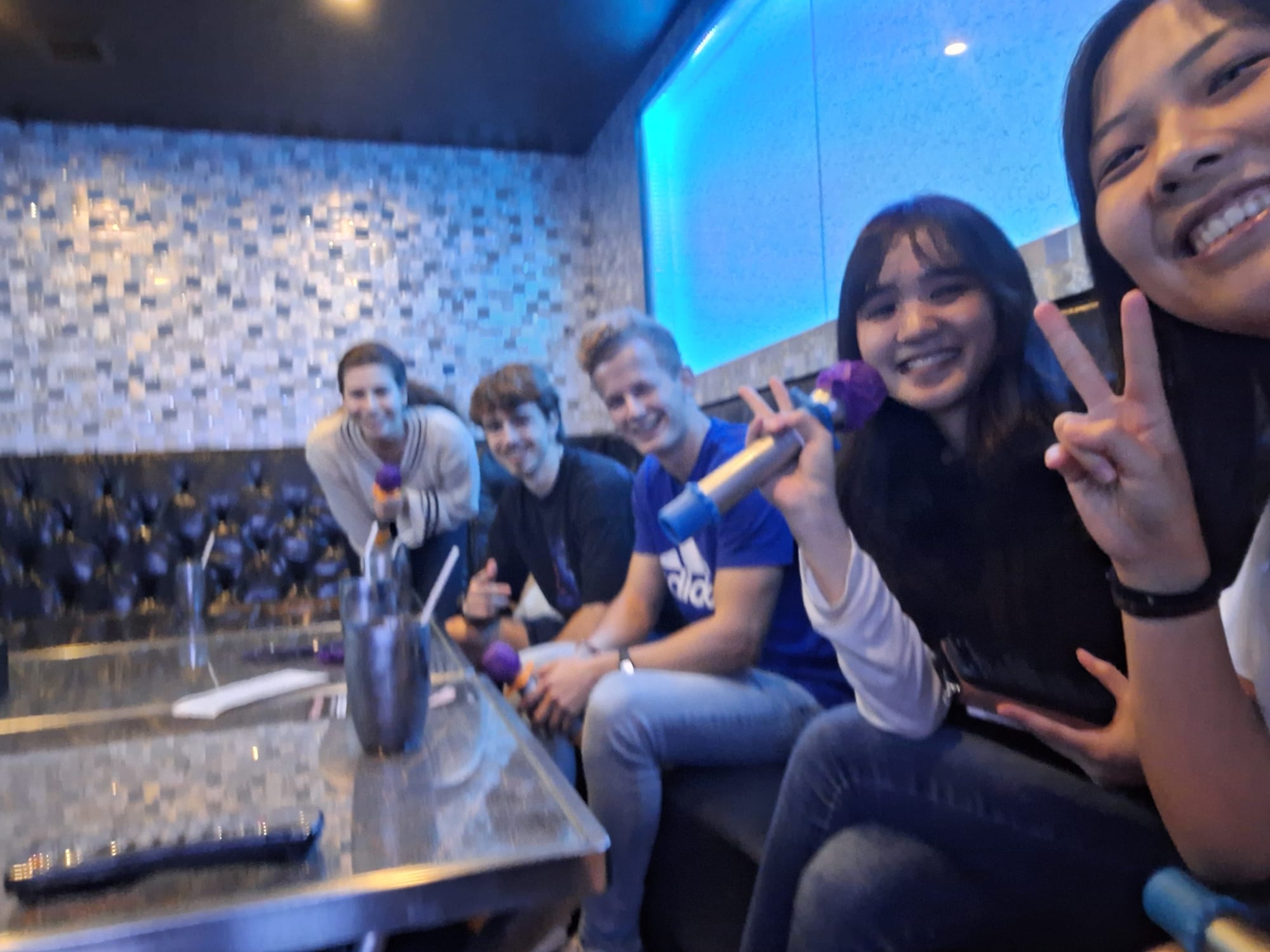
What does the university offer the student additionally?
The university has canteens where you can eat a variety of mostly Asian food, a library, a few sports halls and a swimming pool, and laundry rooms are present in each dormitory hall (for a fee). There is also a music room which I occasionally reserved with a friend, where they have a piano and several other instruments.
5. Housing-travelling-living
What are the possibilities for housing?
The university provides dormitory rooms on campus for every exchange student. In my case, I got assigned an off-campus dorm, but there were free shuttlebuses between my hall and the university. Rent is pretty expensive in Hong Kong and the rooms are small, but the rent rates for the university dorms were acceptable. You share your dorm with another student and there is a shared bathroom, toilet and common room (sometimes with kitchen).
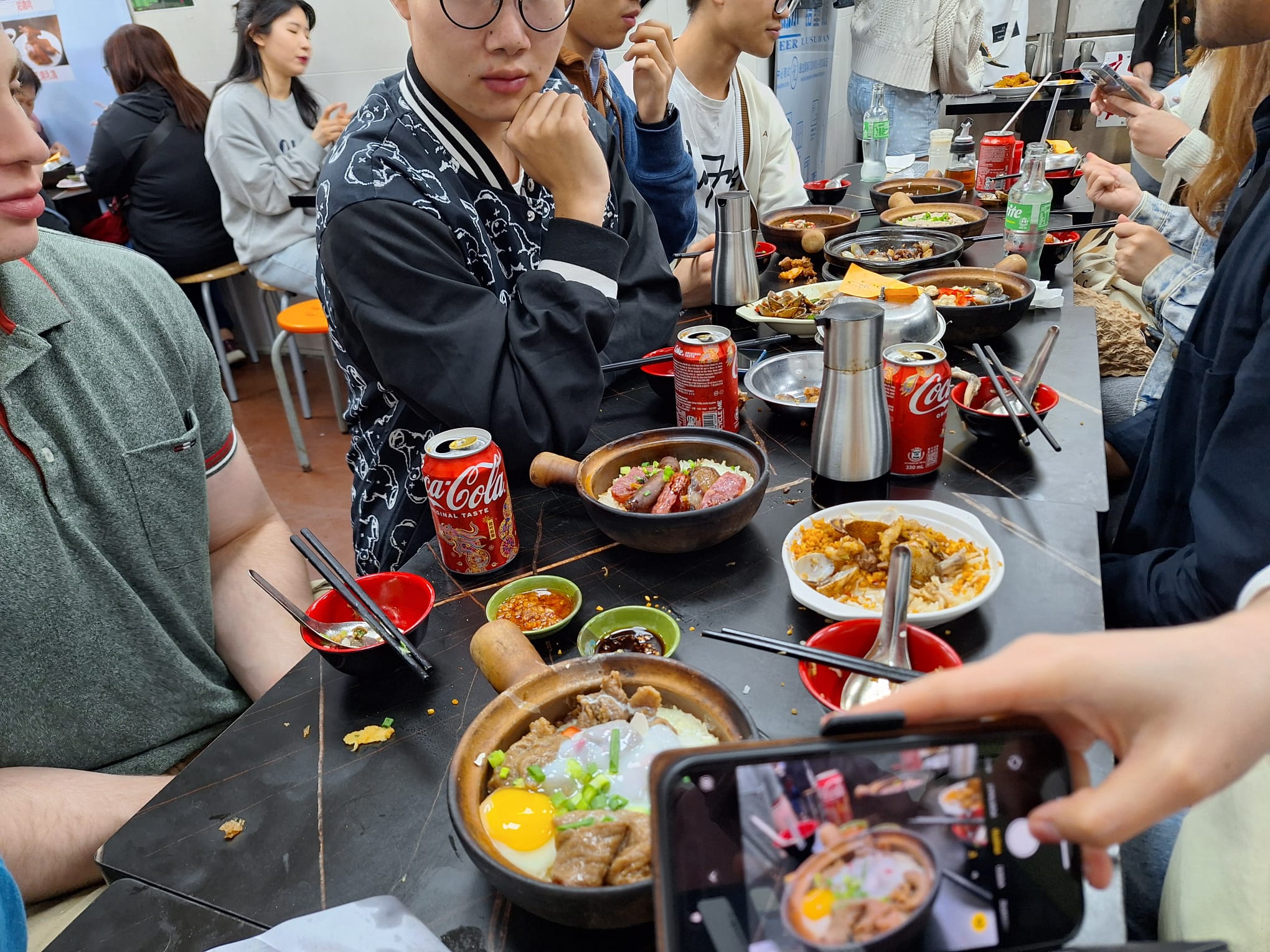
What is the culture like?
Hong Kong is an interesting mix between Western and Asian culture, big city but also nature and mountains. There’s some remnants of colonial architecture, but also traditional Taoist temples. Everywhere you look are huge, very densely packed apartment buildings, but there is still a lot of mountain and nature! That contrast between cultures and landscape makes Hong Kong very unique in my opinion. Hong Kong people are in my opinion really nice and helpful! Some of them are often in a hurry, but they keep to themselves, don’t bother other people and are generally well mannered. The lining up culture here is impressive to say the least.
Could you give some information about public transport infrastructure?
The public transport facilities are really good! The MTR system is really convenient and uses an Octopus card, which you can charge up with cash. This card can also be used in almost any store for purchases, almost like a debit card. I’ve only taken the taxi/Uber twice when I had a lot of luggage or very late at night, when the MTR stopped running. It’s definitely cheaper than in Europe but the public transport is so convenient that I never feel the need to! You can also go by bus, they go very often but the bus lines/names might be a bit confusing at first.
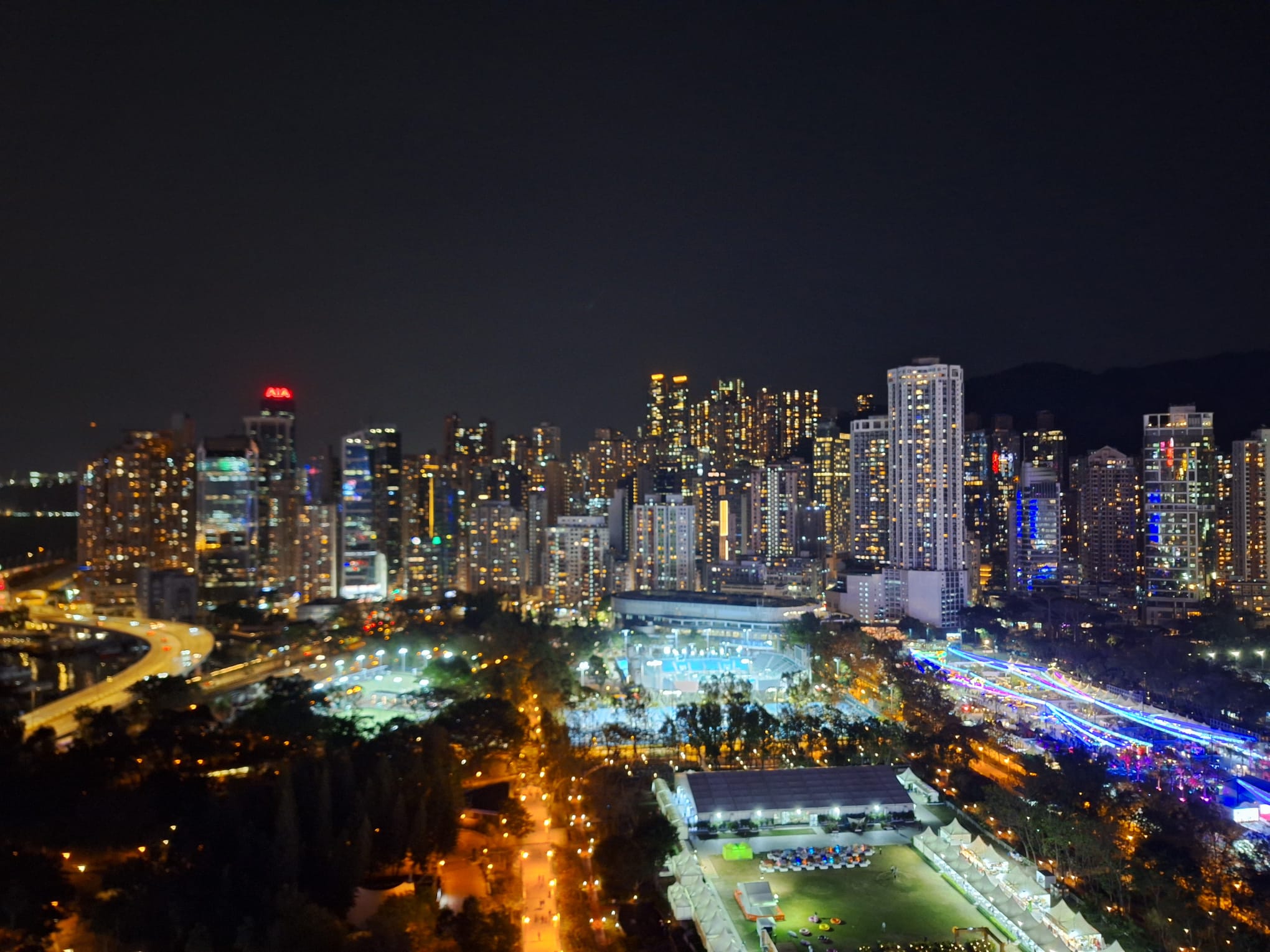
6. Expenses
Can you give an indication of your expenses for/during your exchange?
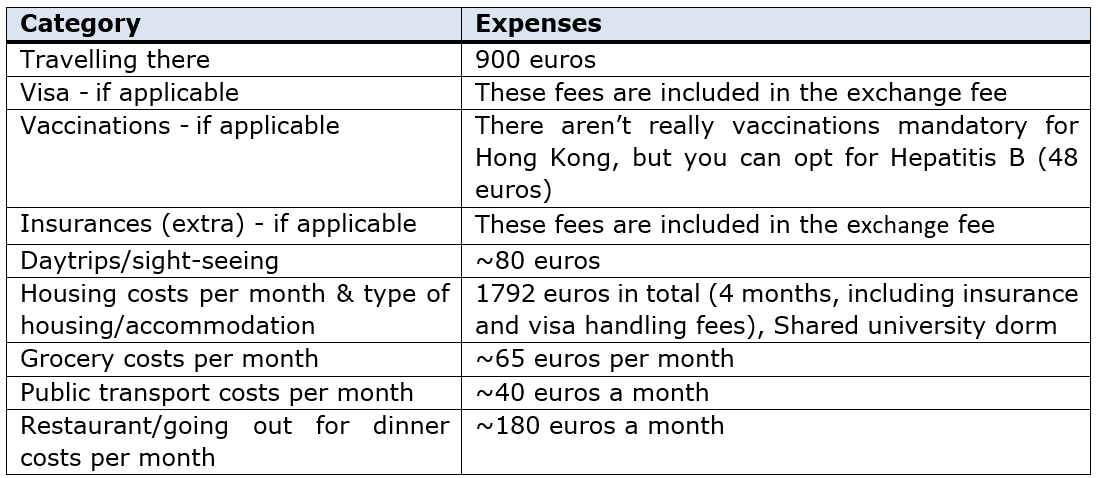
The price levels were in general [higher; lower; equal] in comparison to in the Netherlands:
Higher, although if you choose to cook at home it is lower and/or equal to the Netherlands. But I know that most exchange students in Hong Kong will be eating out/at the canteen, so that will be approximately 5 euros a meal. Eating out in Hong Kong is relatively cheaper, as well as taking public transport. However, alcohol and going out is way more expensive in Hong Kong, so it also depends on the activities you like to do.
Additional remarks regarding expenses?
I spent approximately 800 euros per month, excluding rent and including travel days. I saved quite some money by cooking at home frequently and buying groceries at the wet market (which is much cheaper than Dutch supermarkets, but expect a lot more different produce and cooking methods!). Furthermore, most of my travels I went to mainland, where cost of living is a lot cheaper as compared to for example Japan, Korea or Singapore. But realistically, most exchange students ate at the canteen because it saves more time, and there aren’t really good facilities for cooking and/or doing groceries on campus, as the campus is quite remote.
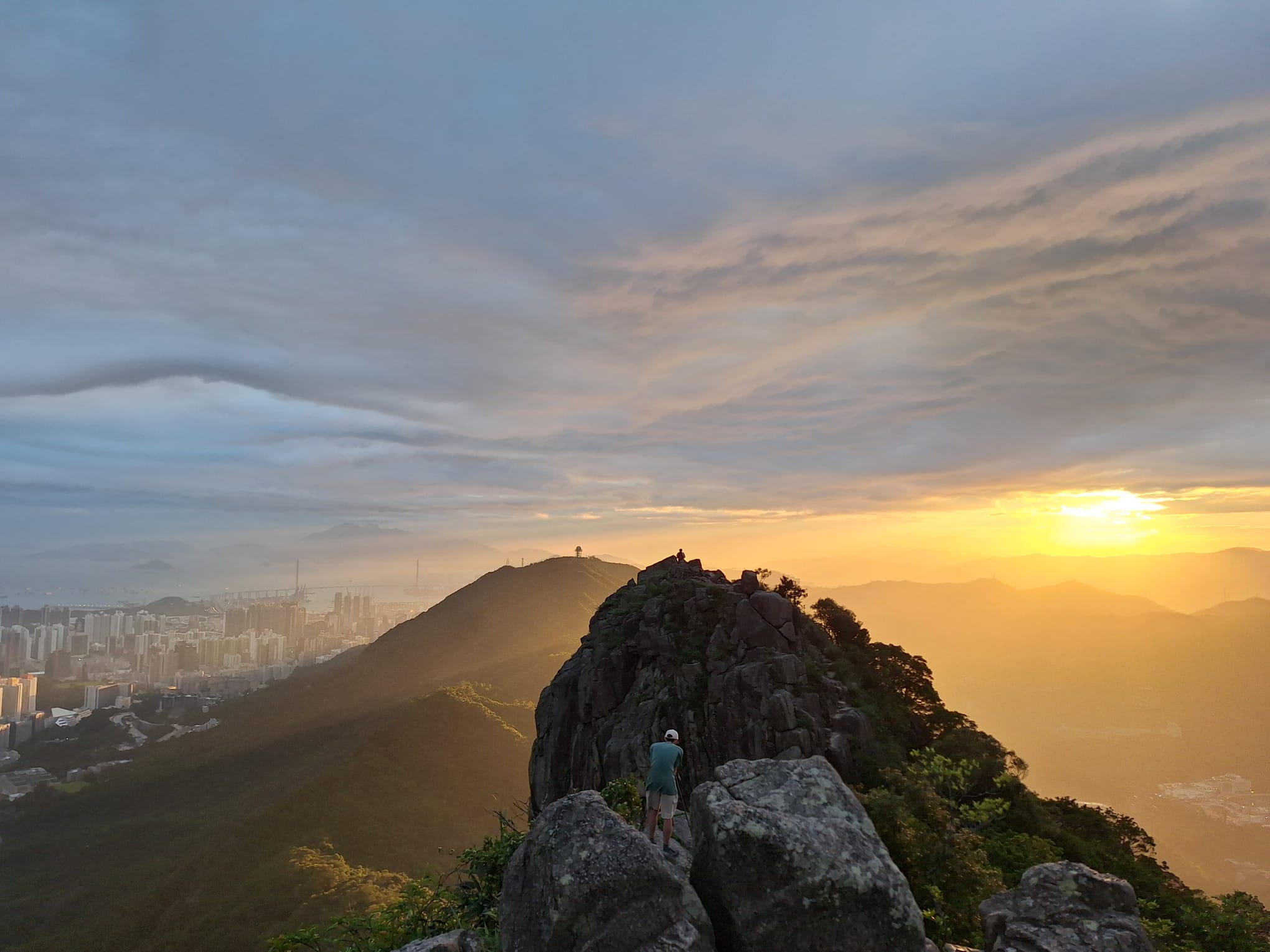
7. Free time
What are must-sees in the area?
Hong Kong is small, but it has a lot of places to see and visit! There are many nice hiking trails which are easily accessible by public transport (e.g. Dragon’s back or Lion Rock) and you can travel by ferry to one of the many islands, like Lamma island, Cheung Chau or the island archipelago in Sai Kung. One of my favorite things to do was to take the Star ferry from Tsim Sha Tsui to Central (or vice versa), it’s really cheap, has great views and sometimes I just took it for fun instead of going with the MTR. Another thing that gets recommended a lot is taking the Peak Tram, but I would not really recommend that: it’s crowded, expensive and very touristy. For outside of Hong Kong, I would definitely recommend to go to mainland China if possible! Currently you can enter visa free for 2 weeks for a select few nationalities (at the time of writing), and it’s very different from Hong Kong. Some other people also went to other southeast Asian countries, as Hong Kong is quite centrally located. Aside from bullet trains that depart to mainland China, the only other option is by plane. I had a one week spring break and I travelled 3 weeks both before and after my exchange period. Almost forgot to mention, but food food food in Hong Kong! Hong Kong is absolutely a food capital and most of my expenses and activities revolved around food. Hong Kong food is made very traditionally and also with a very high level of standard! I really recommend to try going to a Daipaidong or a HK style cafe, eat dim sum, wonton egg noodles, cart noodles, congee, claypot rice, egg tarts, pineapple buns, milk tea, barbecue pork/roasted goose (the list goes on and on!). Also they have food from all over Asia, so you can try Vietnamese, Thai, Japanese, Korean (this one is not too good in my opinion), Indian and so much more! Don’t bother eating at the canteen or Western food in my opinion 😉.
What does not appear in a travel guide, but is definitely worth seeing/doing?
I would definitely try and make some local friends as they know what places are tourist traps and what places they like to go to for fun! For example, one of my friends guided us around the island Cheung Chau, and knew the best hiking trails and food places, and some friends from mainland showed us how to sing karaoke in Shenzhen!
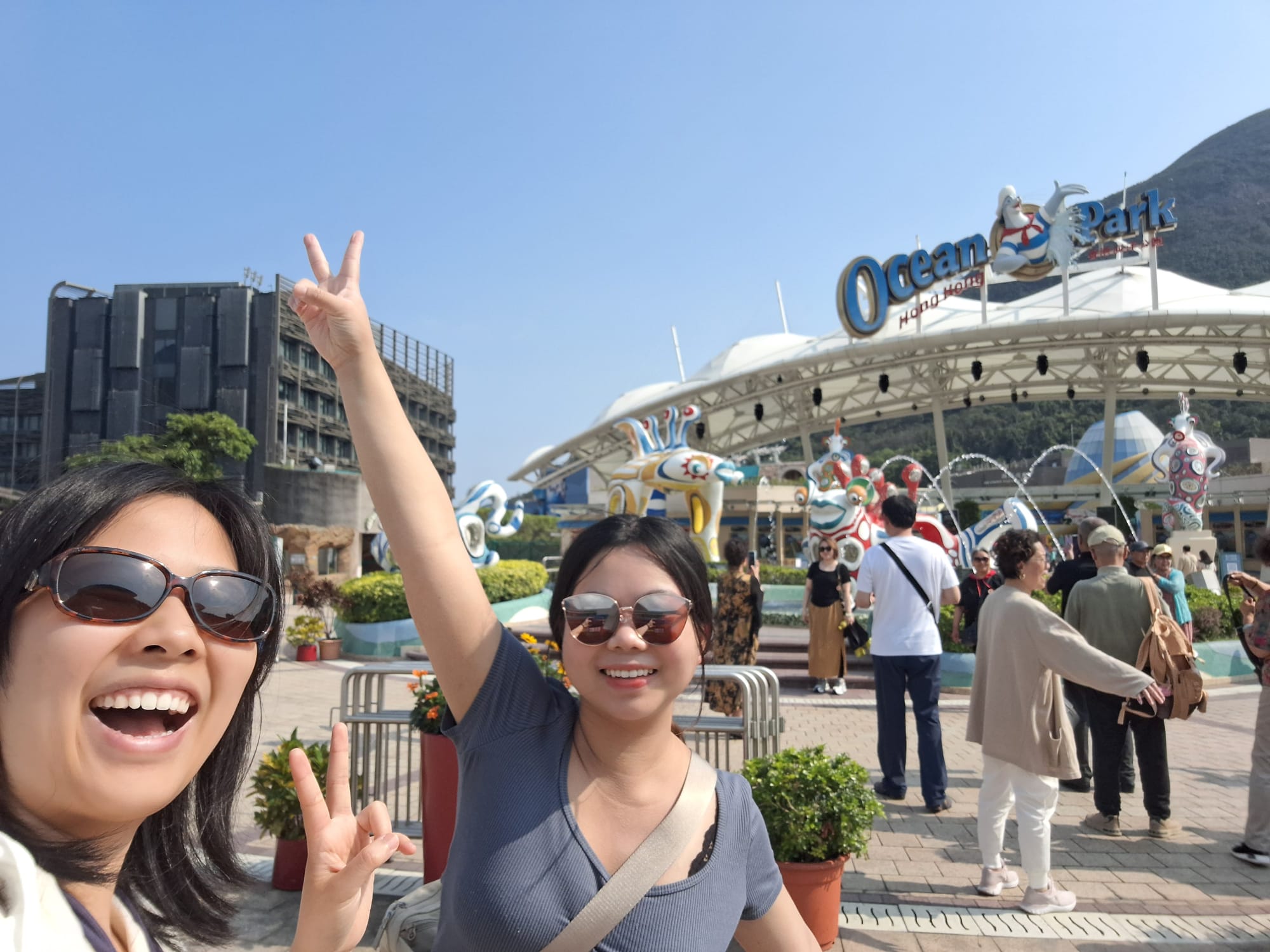
7. Challenges & best moment abroad
What challenges did you encounter and how did you overcome them?
For me, the biggest challenge was the enormous competitive and stressful atmosphere lingering in HKUST. It certainly made me realize that people have such high expectations and pressure from themselves, their family and their environment generally to perform well, and it’s difficult to adjust to that as an exchange student, where I was more looking to explore a new culture and develop myself as a person. Initially I found myself swept in the competitive culture, but made me enjoy and explore Hong Kong less. So I learned to let go more and not try to compare my performance with my peers.
What is your best memory of your time abroad?
I grew very fond of just reserving a karaoke room in HK or mainland and just chill there with some friends! Also really liked all the times I went out to eat dimsum, or hotpot or any other communal style of eating. Also, I really cherish the time I spent with my family, especially during Chinese New Year.
8. Contact Details
Would you like to ask Kayleen more questions about her exchange?
Send her a mail: Kayleen.ma@wur.nl

